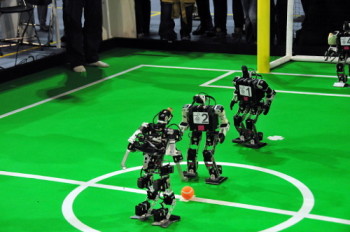Learning from our Artificial Brethren
January 12, 2016
on
on

That's what Joscha Bach said during a fascinating talk at the Chaos Communication Conference taking place 27-30 December, 2015 in Hamburg, Germany. Bach started out studying philosophy and computer science at the Humboldt University of Berlin and now applies that dual interest by looking at Artificial Intelligence to understand the human mind. He currently works as a Cognitive Scientist at the Harvard Program for Evolutionary Dynamics.
Bach wrote a simulation of a world when he worked on robotics soccer. “You have a bunch of robots that have a model of what happens on the playing field. Physics generates data for their sensors, they read the bits of the sensors and then they use them to update their world model.” But robots are too expensive and heavy to always bring along. “We wrote a computer simulation of the playing field and the physics and so on which generates pretty much the same data and put the robot mind into a simulated robot body and this works just as well. That is, if you are the robot because you can not know the difference if you are the robot. You can not know what is out there. The only thing you get to see is the structure of the data at your systemic interface.”
And it is no different for humans. Our mind makes models of the world based on the data from our five senses. “When you discover you are in same situation as these robots, you discover you are some kind of biological robot that does not have direct access to the world. That never got to see matter and energy and other people. All it got to see is little bits if information the brain had to make sense of”, Bach said.
The talk Computational Meta-Psychology: An Artificial Intelligence Exploration Into The Creation Of Meaning is available at the CCC website. Highly recommended: Bach explains how the minds of genius people work, that religion is a mind-virus and why the maladaptive traits of nerds are a benefit in natural selection for the first time in history.
Read full article
Hide full article


Discussion (0 comments)